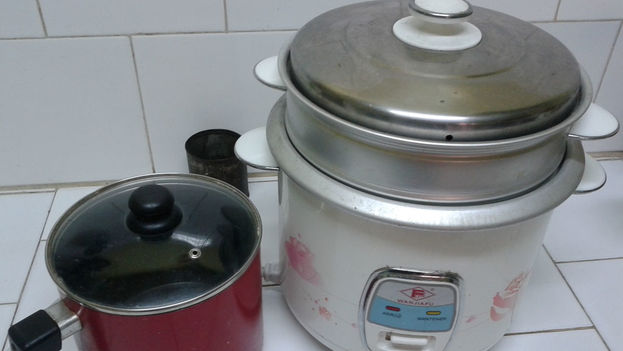
![]() 14ymedio, Victor Ariel Gonzalez, Havana, 24 April 2015 – She didn’t have any luck. Like many, Estrella is one of those Cubans who faces the difficult task of feeding her children today without being very sure of what she will feed them tomorrow. Even still, hers is a family that is not classified as being in need of social assistance; thus, they will not receive any help from the State to buy the new induction stovetops that will go on sale “in a few days.”
14ymedio, Victor Ariel Gonzalez, Havana, 24 April 2015 – She didn’t have any luck. Like many, Estrella is one of those Cubans who faces the difficult task of feeding her children today without being very sure of what she will feed them tomorrow. Even still, hers is a family that is not classified as being in need of social assistance; thus, they will not receive any help from the State to buy the new induction stovetops that will go on sale “in a few days.”
This week it was announced that very soon everything will be ready to start the sale of this new kitchen equipment along with other items – a lidded pot, frying pan, pitcher and coffee pot – to the nearly 80,000 nuclear families who receive government assistance. The official media assures that, “the conditions have already been created in the stores of the special program network, belonging to the Ministry of Domestic Trade.”
The conditions include 257 “adequately equipped” workshops to repair the equipment, which carry a three-month commercial warranty. It has also been made easier for the vendors to pass “a training course” to connect the equipment and test it.
The plan has been designed to reduce energy consumption in the residential sector; induction stoves are up to 75% more efficient than resistance stoves, according to the concerned authorities, and, they add, they are easy to use, provide comfort and are more durable.
Behind this decision is none other than the Council of Ministers, whose policy has been responsible for other “bold moves” such as the unrationed sale of liquefied gas in various parts of the country “as an experiment.” Also, since 2014, and thanks to the “Food Cooking Program,” it is possible to buy home appliances through bank loans. In effect, the question of cooking in Cuba is a matter of State.
Estrella was one of those who bought her rice cooker on credit. Of the 7,800 who applied since the beginning, 7,355 have been approved and 5,828 delivered – at a cost of 15 million pesos* – among which we find hers.
In effect, cooking in Cuba is a matter of State
However, it wasn’t totally easy. First, because this pharmacy employee doesn’t earn enough wages for the bank to have confidence she can make on-time payments for her rice cooker. As in capitalism, lending to individuals in Socialist Cuba involves a risk analysis that weighs an individual’s ability to repay the debt.
Secondly, because she wouldn’t have been able to afford it without the help of some family members. But Estrella needed the pot, even though she would have to sell more medicines under the table than usual.
The issue of subsidies granted by Social Assistance is a delicate one. The form of payment with respect to the appliances that will soon be sold has not been completely defined, except that the acquisition of the stoves could be fully or partially charged to the State.
The Ministry of Labor and Social Security (MTSS) has declared the Provincial Administration Council is “the collective body that approves the sale of these stoves and decides which method of payment will be applied” in each case. To accomplish this they will work on standards for “socioeconomic assessment.”
Yusimí Campos, an official with MTSS, informed the national media that, among the families not benefitting there are also those “who cook their food with other services such as manufactured gas, liquefied gas or (…) those who live in remote areas and who have no electricity service.”
Estrella, who has piped gas in her Central Havana apartment, will have to wait a while to acquire a modern stove. Meanwhile, she has to finish paying the bank for her Chinese made Haier refrigerator. The last thing Estrella wants is another debt. And with regards to food, “something will come up,” she says, while showing a small reserve of eggs and rice that keeps her calm, at least for now.
*Translator’s note: Roughly running the math on these numbers gives the price for a rice cooker as somewhere between $80 and $100+ dollars. This is for an appliance that sells in the U.S. (looking at the one in the photo) for plus-or-minus $20. In other words, the government “loans” Cubans as much as six months wages, so that they can purchase one rice cooker.
